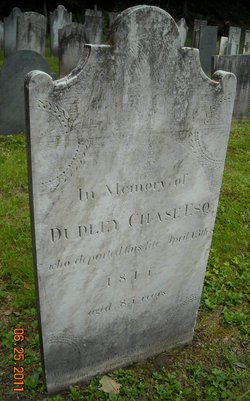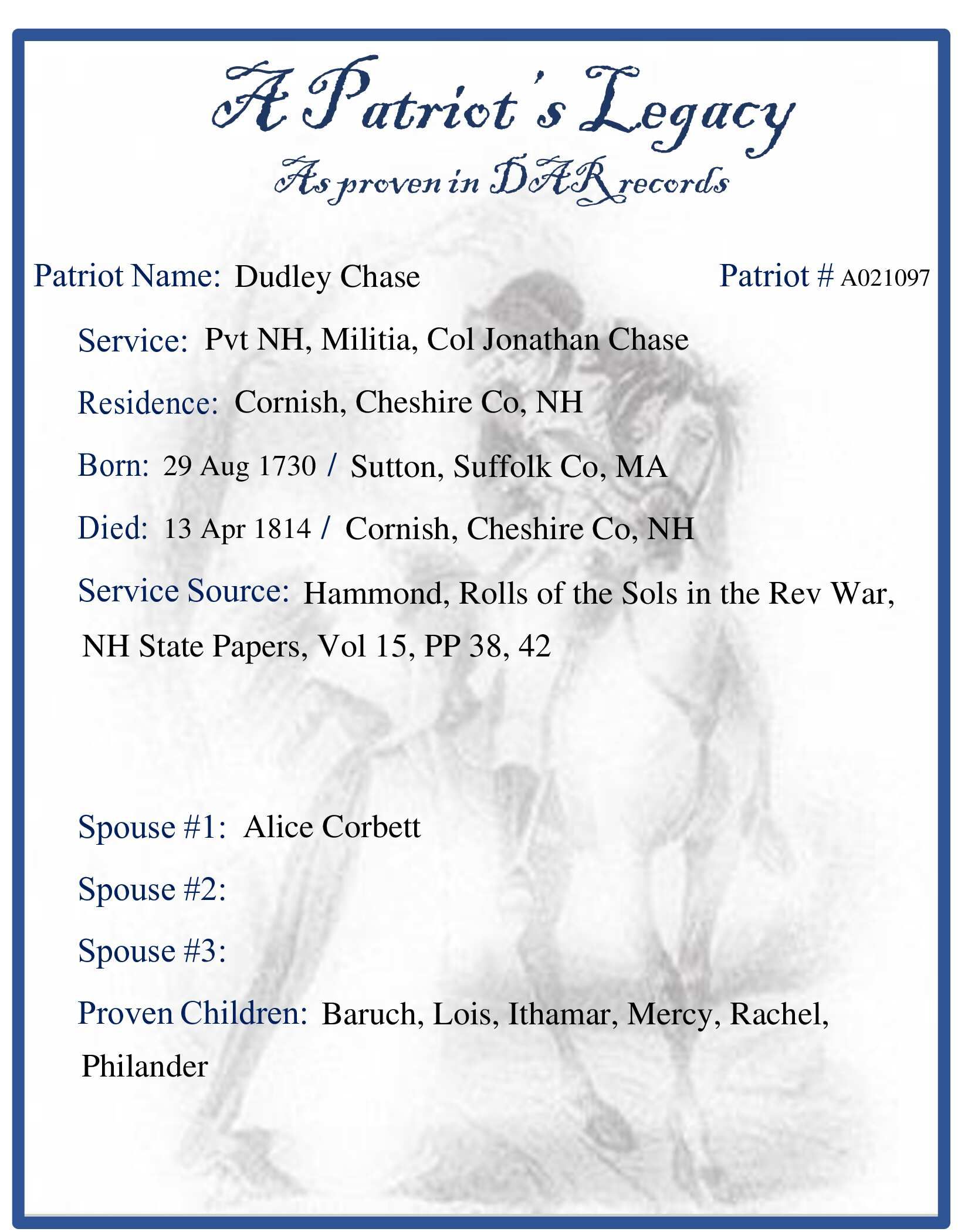m Alice Corbett
If the honor of being the first settler in Cornish belongs to any one individual more than another it would seem that Dea. Dudley Chase can claim it. At the age of 35, in the strength of manhood and possessed of the spirit of enterprise and a desire to provide ample means for his already numerous family, he, with others, was the first to make a clearing in the wilds of Cornish.
Eight children were b. to this couple before coming to town and seven afterwards. The first white child b. in town was their ninth. In many respects this was a remarkable family. Fourteen of the fifteen children grew to maturity and filled useful and even brilliant positions in life. Five of the sons were educated at Dartmouth College, while the entire number sought and acquired high degrees of scholarly attainments.
The modern student may well query: How did they? How could these young men be prepared for college under such circumstances? There were then no "Lessons in Latin made easy," no "English Notes," no "Ponies," but the boys just dug their way through with a determination that would astonish many a modern student, because filled with high
aspirations and with the gladness of a pure and happy youth, all difficulties were overcome.
All this was about seventy years before the first railroad car steamed up the Connecticut valley, crossing the farm once theirs, that brought the modern paraphernalia that is called Advanced Civilization.
The relation of a circumstance here may be of interest to many. In 1780 Deacon Chase began to consider ways and means for providing his family with homes for themselves. Being "well-to-do," he proposed to invest in more land. He therefore started out to explore the west branch of Wliite River in Vermont.
He made the journey on foot and alone. Late at night, weary and hungry he made his camp in the unbroken forest, at a point near the present site of Christ's Church in Bethel, Vt. He found a convenient stone for a pillow and there spent the night. He fell asleep, and, like Jacob of old, dreamed a similar dream. He interpreted this as a token that he had found the land that he was seeking. Upon awakening and resuming his search, he saw that the meadow lands up the branch were fair and fertile. He therefore concluded to make an extensive purchase of land, and named it Bethel and the western part Gilead, and Bethel-Gilead it has been unto this day.
Several of his family and their children subsequently settled in Bethel, being the first settlers of that town.
Deacon Chase and wife, however, never removed their home from Cornish, but each lived to an advanced age. After her death--which occurred Sept. 13, 1813, he at times conceived himself away from home and would piteously beseech his family to take him home. Still, at times, he would visit his wife's grave with unclouded reason, and he caused this couplet to be inscribed on her tombstone:
"An angel's arm can't snatch me from the grave, Legions of angels can't confine me there."
He survived her but a few months, dying April 13, 1814. On his tombstone is written:
"This is the way to immortality."
Military service - Private in Col. Jonathan Chase's Regiment of N H Militia, Rev War. Entered service 4 Jul 1777
Source:
- History of the Town of Cornish NH by William H Child
m Alice Corbett
If the honor of being the first settler in Cornish belongs to any one individual more than another it would seem that Dea. Dudley Chase can claim it. At the age of 35, in the strength of manhood and possessed of the spirit of enterprise and a desire to provide ample means for his already numerous family, he, with others, was the first to make a clearing in the wilds of Cornish.
Eight children were b. to this couple before coming to town and seven afterwards. The first white child b. in town was their ninth. In many respects this was a remarkable family. Fourteen of the fifteen children grew to maturity and filled useful and even brilliant positions in life. Five of the sons were educated at Dartmouth College, while the entire number sought and acquired high degrees of scholarly attainments.
The modern student may well query: How did they? How could these young men be prepared for college under such circumstances? There were then no "Lessons in Latin made easy," no "English Notes," no "Ponies," but the boys just dug their way through with a determination that would astonish many a modern student, because filled with high
aspirations and with the gladness of a pure and happy youth, all difficulties were overcome.
All this was about seventy years before the first railroad car steamed up the Connecticut valley, crossing the farm once theirs, that brought the modern paraphernalia that is called Advanced Civilization.
The relation of a circumstance here may be of interest to many. In 1780 Deacon Chase began to consider ways and means for providing his family with homes for themselves. Being "well-to-do," he proposed to invest in more land. He therefore started out to explore the west branch of Wliite River in Vermont.
He made the journey on foot and alone. Late at night, weary and hungry he made his camp in the unbroken forest, at a point near the present site of Christ's Church in Bethel, Vt. He found a convenient stone for a pillow and there spent the night. He fell asleep, and, like Jacob of old, dreamed a similar dream. He interpreted this as a token that he had found the land that he was seeking. Upon awakening and resuming his search, he saw that the meadow lands up the branch were fair and fertile. He therefore concluded to make an extensive purchase of land, and named it Bethel and the western part Gilead, and Bethel-Gilead it has been unto this day.
Several of his family and their children subsequently settled in Bethel, being the first settlers of that town.
Deacon Chase and wife, however, never removed their home from Cornish, but each lived to an advanced age. After her death--which occurred Sept. 13, 1813, he at times conceived himself away from home and would piteously beseech his family to take him home. Still, at times, he would visit his wife's grave with unclouded reason, and he caused this couplet to be inscribed on her tombstone:
"An angel's arm can't snatch me from the grave, Legions of angels can't confine me there."
He survived her but a few months, dying April 13, 1814. On his tombstone is written:
"This is the way to immortality."
Military service - Private in Col. Jonathan Chase's Regiment of N H Militia, Rev War. Entered service 4 Jul 1777
Source:
- History of the Town of Cornish NH by William H Child
Family Members
Advertisement
Records on Ancestry
Sponsored by Ancestry
Advertisement
























